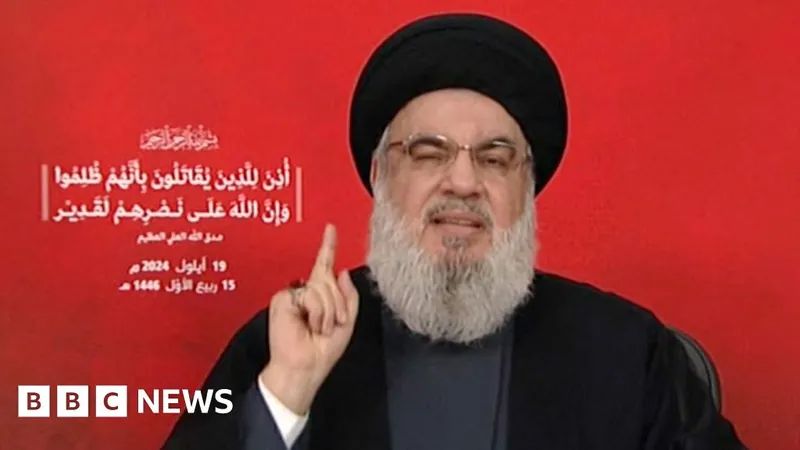
Unveiling the Enigmatic Leader of Hezbollah: Hassan Nasrallah
2024-09-28
Author: Wai
Introduction
Sheikh Hassan Nasrallah, the charismatic and formidable leader of Lebanon's militant Shia group Hezbollah, stands as one of the most influential figures in the Middle East today. Renowned for his strategic acumen, he has carved out a significant role on both the political and military landscapes of the region.
Background and Early Life
The mysterious Nasrallah, who was believed to be the target of a recent airstrike in Beirut, has remained out of the public spotlight for years, primarily due to concerns for his safety amidst ongoing threats, particularly from Israel. Despite his absence, he continues to command fierce loyalty from Hezbollah supporters and maintains a pivotal connection with Iran, which provides vital military and logistical support to the organization.
Rise of Hezbollah
Under Nasrallah's leadership, Hezbollah has evolved dramatically since its inception as a grassroots militia aimed at resisting Israeli occupation in Lebanon. The group has significantly strengthened its military capabilities, now positioned as a force more powerful than the Lebanese armed forces. It has also become a pivotal player in Lebanese politics and a crucial provider of health and social services, a role that has endeared it to many citizens amidst widespread government inefficacy.
Political Awakening and Hezbollah's Formation
Born into humble beginnings in 1960 in Bourj Hammoud, a suburb of Beirut, Nasrallah's early life was shaped by the tumultuous backdrop of the Lebanese Civil War, which erupted in 1975. His political awakening began with his involvement in the Amal movement, a Shia militia, and later, he participated in a Shia seminary in Iraq. Following a split from Amal in 1982, Nasrallah played a fundamental role in establishing Hezbollah, which announced its existence through an "open letter" in 1985, declaring a mission to "obliterate" Israeli presence in the region.
Leadership and Key Achievements
Rising through the ranks, Nasrallah became the leader of Hezbollah in 1992 at the age of 32 after the assassination of his predecessor, Abbas al-Musawi, in an Israeli airstrike. Under his guidance, Hezbollah engaged in a fierce resistance against Israeli forces, achieving significant milestones, including the complete withdrawal of Israeli troops from southern Lebanon in 2000. This event was celebrated as a watershed moment—Nasrallah proclaimed it as the "first Arab victory against Israel," a narrative that has continued to resonate with many in the Arab world.
Challenges Faced
However, Nasrallah’s journey has not been without challenges. The July 2006 war erupted following Hezbollah's cross-border raid that resulted in Israeli casualties. The conflict led to widespread destruction in Lebanon and heightened tensions across the region, with Nasrallah emerging from the ordeal unscathed, further solidifying his status as a resilient leader.
Geopolitical Dynamics and the Syrian Civil War
In subsequent years, Nasrallah adapted Hezbollah’s approach to shifting geopolitical dynamics, evidenced by the group's involvement in the Syrian civil war starting in 2013, as it supported President Bashar al-Assad against various rebel factions. This intervention deepened sectarian divides in Lebanon and drew criticism from Sunni political leaders.
Recent Developments and Future Implications
The recent years have seen Lebanon grappling with an unprecedented economic crisis, prompting mass protests against governmental corruption and mismanagement. Although at first, Nasrallah expressed understanding toward reform demands, his stance evolved as calls for systemic change intensified.
As he navigates through these turbulent waters, Hassan Nasrallah remains an enigmatic figure, balancing the interests of Hezbollah, regional alliances, and the complex socio-political landscape of Lebanon. His next moves will undoubtedly shape not just the future of Hezbollah but also the broader Middle East's ongoing struggles for power, identity, and stability.
Conclusion
Stay tuned, as the story of Nasrallah and his strategies continues to unfold against the backdrop of regional and global politics!


 Brasil (PT)
Brasil (PT)
 Canada (EN)
Canada (EN)
 Chile (ES)
Chile (ES)
 España (ES)
España (ES)
 France (FR)
France (FR)
 Hong Kong (EN)
Hong Kong (EN)
 Italia (IT)
Italia (IT)
 日本 (JA)
日本 (JA)
 Magyarország (HU)
Magyarország (HU)
 Norge (NO)
Norge (NO)
 Polska (PL)
Polska (PL)
 Schweiz (DE)
Schweiz (DE)
 Singapore (EN)
Singapore (EN)
 Sverige (SV)
Sverige (SV)
 Suomi (FI)
Suomi (FI)
 Türkiye (TR)
Türkiye (TR)